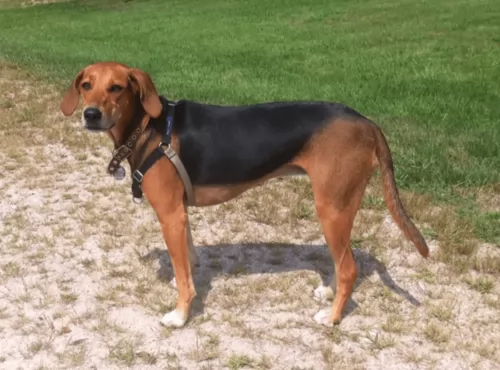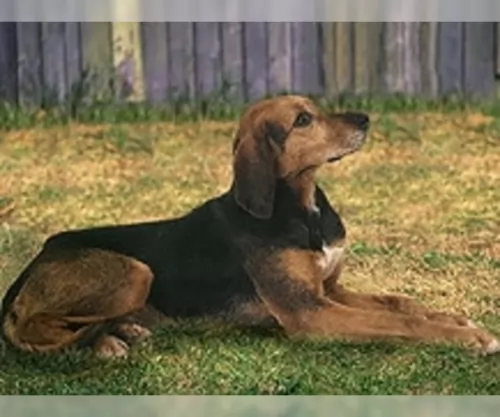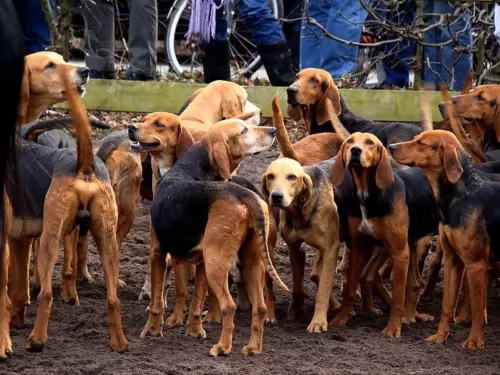 Petzlover
Petzlover Austrailian Blue Heeler is originated from Australia but Kerry Beagle is originated from Ireland. Austrailian Blue Heeler may grow 11 cm / 4 inches shorter than Kerry Beagle. Austrailian Blue Heeler may weigh 11 kg / 24 pounds lesser than Kerry Beagle. Both Austrailian Blue Heeler and Kerry Beagle has almost same life span. Austrailian Blue Heeler may have less litter size than Kerry Beagle. Austrailian Blue Heeler requires High Maintenance. But Kerry Beagle requires Low Maintenance
Austrailian Blue Heeler is originated from Australia but Kerry Beagle is originated from Ireland. Austrailian Blue Heeler may grow 11 cm / 4 inches shorter than Kerry Beagle. Austrailian Blue Heeler may weigh 11 kg / 24 pounds lesser than Kerry Beagle. Both Austrailian Blue Heeler and Kerry Beagle has almost same life span. Austrailian Blue Heeler may have less litter size than Kerry Beagle. Austrailian Blue Heeler requires High Maintenance. But Kerry Beagle requires Low Maintenance
 In 1840, George Elliott made a match with Australian Dingo and Collie and got a clever and very active dog breed – Australian Blue Heeler. Soon, he showed his good herding instincts and protective nature and got really popular among the cattlemen and ranchers. Soon, as the USA soldiers arrived in Australia, they decided that it will be a great dog to bring home.
In 1840, George Elliott made a match with Australian Dingo and Collie and got a clever and very active dog breed – Australian Blue Heeler. Soon, he showed his good herding instincts and protective nature and got really popular among the cattlemen and ranchers. Soon, as the USA soldiers arrived in Australia, they decided that it will be a great dog to bring home.
Australian Blue Heeler has short, double coat. The coat is water resistant and helps them when the temperature is too high as well. Their coat is rough to the touch, naturally. They can be found in blue or red coat colour mix. The Blue Heeler isn’t actually blue, but their black coat has a bluish tint. Red Heelers have red fur instead of black. They have long tails, strong legs, Dingo-like heads with pointy ears and muscular necks and balanced and athletic bodies.
 The Kerry Beagle is an ancient dog breed, thought to go back as far as the 16th century and looked upon as one of the oldest of all the Irish dog breeds. The dog was introduced to Ireland by the Celts.
The Kerry Beagle is an ancient dog breed, thought to go back as far as the 16th century and looked upon as one of the oldest of all the Irish dog breeds. The dog was introduced to Ireland by the Celts.
It is believed to have descended from the Old Southern Hound or Celtic Hounds.The Kerry Beagle was taken by Irish immigrants to America and is a foundation breed in the development of the Coonhound for hunting and scenting.
The Kerry Beagle isn't recognized by the AKC but has been recognized by the Irish Kennel Club in 1991. It is still rare outside of Ireland and it hasn't been recognized by major kennel clubs.
 This breed is somehow designed for an outdoor life and outdoor activity. This implies that Blue Heelers have nature made of the high dose of energy. They are always ready to go anywhere you go, and they will be a loyal friend. They are actually very clever, intelligent and ready to help.
This breed is somehow designed for an outdoor life and outdoor activity. This implies that Blue Heelers have nature made of the high dose of energy. They are always ready to go anywhere you go, and they will be a loyal friend. They are actually very clever, intelligent and ready to help.
If you are a type of the person who prefers being indoors and having minimal physical activity, Blue heelers are not the type of a furry companion for you. They have a high daily need for the activity, and they love having lots of space to run and explore. Sometimes, you will realize that having a leash is a must because they will get so playful that they will forget about you!
If you start teaching them to be friendly with other dogs while they are still pups, they will accept that kind of lifestyle. But, if your Blue Heeler is raised as the only dog on the ranch, note that they won’t be very friendly toward other dogs.
Since most of the herd dogs usually respond to only one person, most of the Blue Heelers can follow this old instinct. They can be very independent, as well, and they are usually not the type of the dog that will always be around your leg waiting for a cuddle or ear scratch. But, they build the respect towards humans depending on how they treat him so they can be very lovable and friendly pets.
If you are still confused about their name, you must know that the Blue Heelers can actually lightly nip your heel for attention. They are not aggressive, but they tend to be very protective of the family, humans around them and their property.
 The Kerry Beagle is a medium sized dog with a solid physique. He stands at about 56 – 61cm and weighs between 22 and 27kg. He has a broad head with drop ears. His eyes are large and deep set and are a yellow to brownish color, giving the dog an intelligent expression.
The Kerry Beagle is a medium sized dog with a solid physique. He stands at about 56 – 61cm and weighs between 22 and 27kg. He has a broad head with drop ears. His eyes are large and deep set and are a yellow to brownish color, giving the dog an intelligent expression.
His coat is short and the most common color for this dog is black and tan, but you can also find tan and white or some blue mottling as well. He is a lean, muscled dog with a deep chest and legs which are slim and long, providing the dog with the ability to pick up speed on a hunt. The tail of the dog is long and slightly curved and carried level.
As a packhound this dog is a serious hunter. He may look aggressive as he goes after his prey but he is actually a calm, well-balanced, friendly dog who forms a strong, loving relationship with his human family.
He is also gentle and playful with children in the home and also gets on well with other dogs too. He is intelligent and will readily respond to training and socialization. It's a dog that just loves being outside, especially when there is something to do, such as playing ball games or going on a long walk.
He is alert and inquisitive and makes an excellent watchdog. A home with a good sized garden will be ideal for the Kerry Beagle, though it can be kept in small gardens in the city too, just so long as he is given the opportunity for daily exercise.
 They are generally good with children, but you must be aware of their inherent desire to herd. Always supervise when your Blue Heeler is around small children.
They are generally good with children, but you must be aware of their inherent desire to herd. Always supervise when your Blue Heeler is around small children.
Ball tricks, frisbee fun, running companion, herding cattle.
It is best to buy a puppy. These dogs get attached to one human and to the territory.
They are generally quick learners. If you teach them to be playful, friendly and loving, they will learn it in no time. So be aware of the decisions that can cost you when the dog grows up.
 The Kerry Beagle may well be quite an aggressive dog when showing off his hunting skills, but when it comes to being around his human family, he softens up and becomes a gentle, loving friend.
The Kerry Beagle may well be quite an aggressive dog when showing off his hunting skills, but when it comes to being around his human family, he softens up and becomes a gentle, loving friend.
He is an affectionate playmate for children and also gets on well with other dogs you may have in the home.
Your Kerry Beagle is alert, intelligent and active, and when you have one of them as a 4-legged family member, you'll discover what a wonderful, devoted companion he can be.
 Progressive Retinal Atrophy usually causes slow and painless loss of sight. This process takes years, but there are cases where this disease took only months before the dog ended up completely blind.
It is advisable to take your Blue Heeler to the vet for a test that can tell you if your dog is carrying the gene for this disease.
Progressive Retinal Atrophy usually causes slow and painless loss of sight. This process takes years, but there are cases where this disease took only months before the dog ended up completely blind.
It is advisable to take your Blue Heeler to the vet for a test that can tell you if your dog is carrying the gene for this disease.
Lens luxation is a disease where the lens of dog’s eye separates partially or completely. Good news is that this disease can be treated.
Most common is the hip or elbow dysplasia. This is the disease where hip joints do not develop properly and begin to grind. This condition can sometimes be treated with physiotherapy, but there is a chance that your Blue Heeler will need a surgery. If you have a habit of regular vet checks and keeping your dog slim and fed with quality food, you can a make a big difference.
Osteochondritis Dissecans (OCD) causes the dog to have excess cartilage and deficient bone, where cartilage does not get replaced by bone during fetal development. This disease usually requires surgery and prescribed medicines.
Congenital hereditary sensorineural deafness – CHSD is a common form of deafness.
Bilateral deafness can be identified when the dog is still a puppy, more-less at six weeks of age. A puppy with deafness in only one ear is harder to identify, but it can happen.
Portosystemic shunt means that the blood flow is getting back into the bloodstream instead of passing through the liver. That means that liver can’t clear out the toxins, and the organ itself fails to grow properly. This inherited type of shunt can be treated with surgery if the diagnose is set on time.
 If your Kerry Beagle is ill or injured you need to get him to the vet for a full assessment. As a puppy he will also need certain vaccinations to protect him from some life-threatening illnesses as well as getting de-wormed.
If your Kerry Beagle is ill or injured you need to get him to the vet for a full assessment. As a puppy he will also need certain vaccinations to protect him from some life-threatening illnesses as well as getting de-wormed.
Bad smelling breath is a symptom that your pet's teeth need checking. If you're not sure how to maintain his teeth, make sure your Kerry Beagle has professional dental cleaning to ensure his gums and teeth are kept in a healthy state. Your vet will give you advise on how to watch for periodontal disease.
In hot weather particularly, check your dog over for fleas and ticks and remove them.
Heartworm is a fatal disease which which can affect your dog. Speak to your vet about treatments as living in a hot, wet area opens you pet up to bites from infected mosquitoes.
 Choose a dog food that will provide nutrients that will help in the bone developing. Since they are more likely to suffer from joint diseases, you must take this advice seriously. It would be great if you speak about this with your vet before you choose food on your own.
Choose a dog food that will provide nutrients that will help in the bone developing. Since they are more likely to suffer from joint diseases, you must take this advice seriously. It would be great if you speak about this with your vet before you choose food on your own.
The best food for Blue Heeler is a high-quality food which supplies them with premium nutrition to fuel their activity.
They also drink a lot of water, so be sure that they always have a fresh water available.
Lots and lots of the outdoor activity and a quality food. You must be very cautious because this kind of dogs gets overweight easily because they just love the treats and extra food portion.
Any outdoor activity that is mentally challenging and interesting enough to keep them from running in the field trying to catch anything that moves.
 Because of the short coat of the Kerry Beagle, he is looked upon as a low maintenance dog. He doesn't shed very much, and simple grooming is required such as brushing the coat twice a week.
Because of the short coat of the Kerry Beagle, he is looked upon as a low maintenance dog. He doesn't shed very much, and simple grooming is required such as brushing the coat twice a week.
His nails will also need to be clipped, as left long, they can hook on things and rip your pet's flesh.
You will need to check his teeth and also check inside his ears. Dogs with floppy ears are more prone to infection in the ears and this can cause terrible pain for your pet.
If you keep your Kerry Beagle as a hunting dog, you will know that active dogs like these have different dietary requirements to companion dogs.
All that activity requires top quality nutrition and a certain amount of calories. If you're buying dry kibble, make sure its the highest quality so that he doesn't require huge portions to satisfy him. Leading canine nutritionists recommend a hunting dog like this be fed a large meal once a day and preferably in the evening, after all the hunting action.